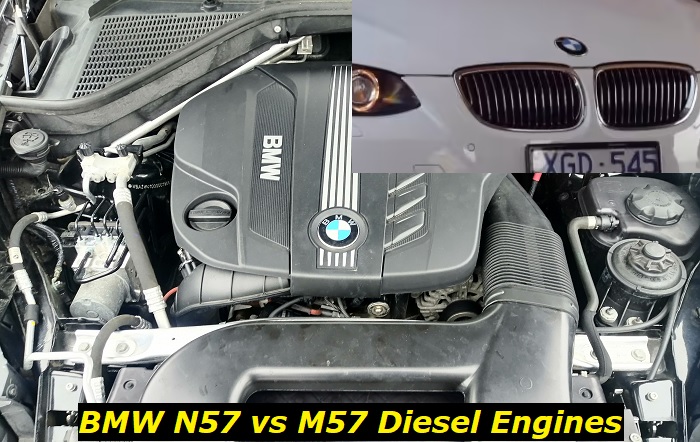The M57 and N57 are two diesel engines manufactured by BMW in different generations. The M57 is a straight-six manufactured from 1998 to 2013 in the automaker's Austrian plant in Steyr. And although very few people know about its existence, the BMW M57 is a tough engine and quite efficient in fuel consumption.
The N57, on the other hand, is a lineup of aluminum turbocharged diesel engines manufactured by BMW. The engine was produced from 2008 to 2019 and directly replaced the M57. It is a common rail engine utilizing variable geometry turbochargers and piezo-electric injectors provided by Bosch.
The significant difference between the engines was that the M57 had an iron block, while the N57 featured an alloy block, which made it significantly light. Other differences included the improvements that the N57 came with, which made the N57 a lower-emissions unit.

Key facts and my opinion about the M57 engine
- Production years: 1998-2013
- Average lifespan of M57: 250,000-300,000 miles
- Fuel supply type: Common Rail
- Power range: 163-282 hp
- Fuel efficiency: excellent
- Engine block material: cast iron
- Engine reliability score: high
- The most common problems: fluid leaks, oil consumption, chain issues in latest generation.
Key facts and my opinion about the N57 engine
- Production years: 2008-2020
- Average lifespan of N57: 220,000-230,000 miles
- Fuel supply type: Common Rail
- Power range: 204-381 hp
- Fuel efficiency: excellent
- Engine block material: aluminum
- Engine reliability score: high
- The most common problems: intake contamination, expensive chain replacement, EGR valve problems.
How Durable Are the BMW M57 and N57?
Generally, BMW expects its diesel engines to last at least 20 years. However, if they are well cared for, the M57 and N57 could last way longer than that. That being said, how durable are the M57 and N57 BMW diesel engines?
Starting with the M57 - this engine has one golden secret, durability, especially in first-generation units built in 1998. The durability of this unit allows it to achieve impressive parameters without any negative consequences - even when pushed beyond limits. The engine is built on potent cast iron and heavy block to give it the rigidity required to last a lifetime. The excellent construction of the M57 results in minimal vibrations, which means the engine gets to live longer.
The turbocharged straight-six is good for 184 horsepower. Debuting in 1998 as an enhanced version of the four-cylinder diesel, the M57 was quite different from its predecessor, the M51. It featured the common rail power system, which made it more economical and dynamic.
As improvements came on board, the engine's block was changed from cast iron to aluminum. Of course, its output and performance were greatly enhanced, but durability was thrown out the window. And this leads us to the BMW N57.
Debuting in 2008 for the 2009 model year, the N57 was designed and engineered from the ground up. The overhaul redesign justified the lettering - it was built entirely with aluminum, which means it has less lifespan than the M57 with the heavy cast iron block. All the N57s are often fitted with 4x4 drive systems.
Like any mechanical machine, the N57 and M57 units have drawbacks, but the positives outweigh the negatives. The engines are designed to last longer and work as hard as you want them to. They are designed and engineered to stand the test of time, even when pushed beyond limits.
M57 and N57 - Power, Performance, and Tuning Options
The M57
Very few engines have traveled from the 1990s through the 2000s and into the modern world. The m57 is one of them. The engine was launched in the late 1990s and exited the market in the 2010s. And it deserves the title of one of the best diesel engines ever made. The M57 came in different setups. Early formats were used in models such as the BMW E39. Later configurations, such as the twin-turbo setup, were fitted in the E60, E90, and E63 6-Series.
Regarding performance, the BMW M57 is one of the best. It features a robust mechanical build that includes a forged steel crankshaft, rods, and cast aluminum pistons.
- Sequential Turbo Configuration
For enhanced performance, the M57 features a sequential turbo arrangement. While in most engines, optimal performance is achieved through a unique two-turbo system on the passenger side of the engine, the BMW M57 sequential turbo system makes the engine a little unique.
In the sequential turbo configuration, the high-pressure turbo is responsible for 99 percent of the work when the engine is at a slow speed. The low-pressure-turbo takes over when engine speed increases (higher rpm) - when a valve bypassing the high-pressure charger opens.
The low and high-pressure turbos are BorgWarner K26 and K39, respectively. The low-pressure turbo is wastegate to shade off excessive drive pressure, which, as a result, prevents the vehicle from overspeeding.
- Common-Rail Fuel Injection - Precise Fuel Delivery
The precise fuel delivery made possible by the high-pressure design of the common-rail fuel injection system is another plus point of the M57's excellent performance. This feature enables the M57 to crank out horsepower and torque numbers that rival big engines.
The engine features Bosch-supplied quick-firing piezo electric injectors that provide precise in-cylinder fuel delivery. And the Bosch CP3 high-pressure pump pressurizes fuel up to 23,000 psi. Thanks to these top-quality components in the fuel delivery system, the BMW M57 is capable of giving a car the ability to clear the quarter mile in under 12 seconds.
The N57
The first BMW N57 was introduced in 2008 in the E9x and F01 7 Series. It was in the form of a 245-horsepower single-turbo engine. In 2009, the single-turbo was followed by a twin-turbo used in the 7 series and 5GT - it produced 306 horsepower.
In 2010, the automaker released the 204-horsepower N57 for 25d models, closely followed by the 258-horsepower version in 2011. The 258hp N57 powered the 30d models. A year later, BMW launched the triple-turbo version of the N57 that powered the 50d models.
Every engine in the N57 lineup displaces 2993cc, irrespective of the turbos and power output. All have an 84mm bore and 90mm stroke but have different mappings, and turbo counts. As you rise from the single-turbo of 2008 to the triple-turbo of 2012, the N57 keeps increasing its power output.
The N57 is an entirely different machine compared to its predecessor, the M57. While the M57 has an iron block, the N57 features an aluminum block. And although this translates to reduced longevity, the N57 is pretty light, efficient, and offers better performance than the M57.
- In Terms Of Technical Effectiveness....
The BMW N57 is unique. While most systems feed all the air through the first turbo, diverting a small amount of air to the larger turbo as you accelerate through the rev range to the point where the larger turbo is about to take over, BMW's system is all different. In the N57, air flows through the large turbo and into the small one.
At around 2000rpm, as you go up the rev range, some exhaust gas is diverted to the larger turbo, which allows it to compress the air before it enters the small turbo, where it is compressed further. At 3000rpm and over, all the exhaust gases are diverted to go through the second turbo. At this point, the N57 delivers maximum power, and there's a seamless transition from one turbo to the other.
The N57D30T0 produced 306 horsepower and 460lb ft. of torque, which BMW later increased to 313hp and 465lb ft. of torque by tweaking the engine in 2011.
In terms of better performance, the N57 follows the mantra of better is always better. They started with a single turbo before adding a second one and a third. The 50d models powered by the triple-turbo N57 version have BMW's xDrive system.
- More Good News about the N57 - It's A Tuning Platform
The BMW N57 is a turbocharged six-cylinder diesel designed and engineered to perform like the big machines - V8 engines, to be precise. Its refinement and excellent power delivery make the N57 different from other diesel engines. The fun part is these engines are seriously detuned from the factory, which means you have a perfect platform with plenty of tuning options.
What Drivers Say
BMW is a major player in the car and engine manufacturing business. As such, most of its products are high-end in quality, reliability, and everything in between. From different forums across the internet, we will share a few reviews and opinions concerning the BMW M57 and N57.
From Bimmerpost, a user asked about the reliability of the N57. Another user on the Bimmerpost forum, responded that the N57 is a pretty reliable engine, relatively rare among BMW engines. And although he leaned in favor of second-generation N57s, he also agreed that first-generations were excellent engines.
Another user on the same platform recommended the N57 for its excellent reliability. According to this guy, all you need to do is to fill your tank with enough diesel and change oil when required. He praises the N57 for its commendable torque, towing, and unbeatable fuel efficiency.
Bottom Line
The BMW M57 and N57 are excellent engines that came at different ages. The N57 is an improvement of the M57. The main difference between the two is that the M57 was an iron block while the N57 was aluminum. In addition, the N57 was an improvement of the m57, improvements that made the N57 better at performance and efficient in fuel consumption.
About the authors
The CarAraC research team is composed of seasoned auto mechanics and automotive industry professionals, including individuals with advanced degrees and certifications in their field. Our team members boast prestigious credentials, reflecting their extensive knowledge and skills. These qualifications include: IMI: Institute of the Motor Industry, ASE-Certified Master Automobile Technicians; Coventry University, Graduate of MA in Automotive Journalism; Politecnico di Torino, Italy, MS Automotive Engineering; Ss. Cyril and Methodius University in Skopje, Mechanical University in Skopje; TOC Automotive College; DHA Suffa University, Department of Mechanical Engineering





Add comment